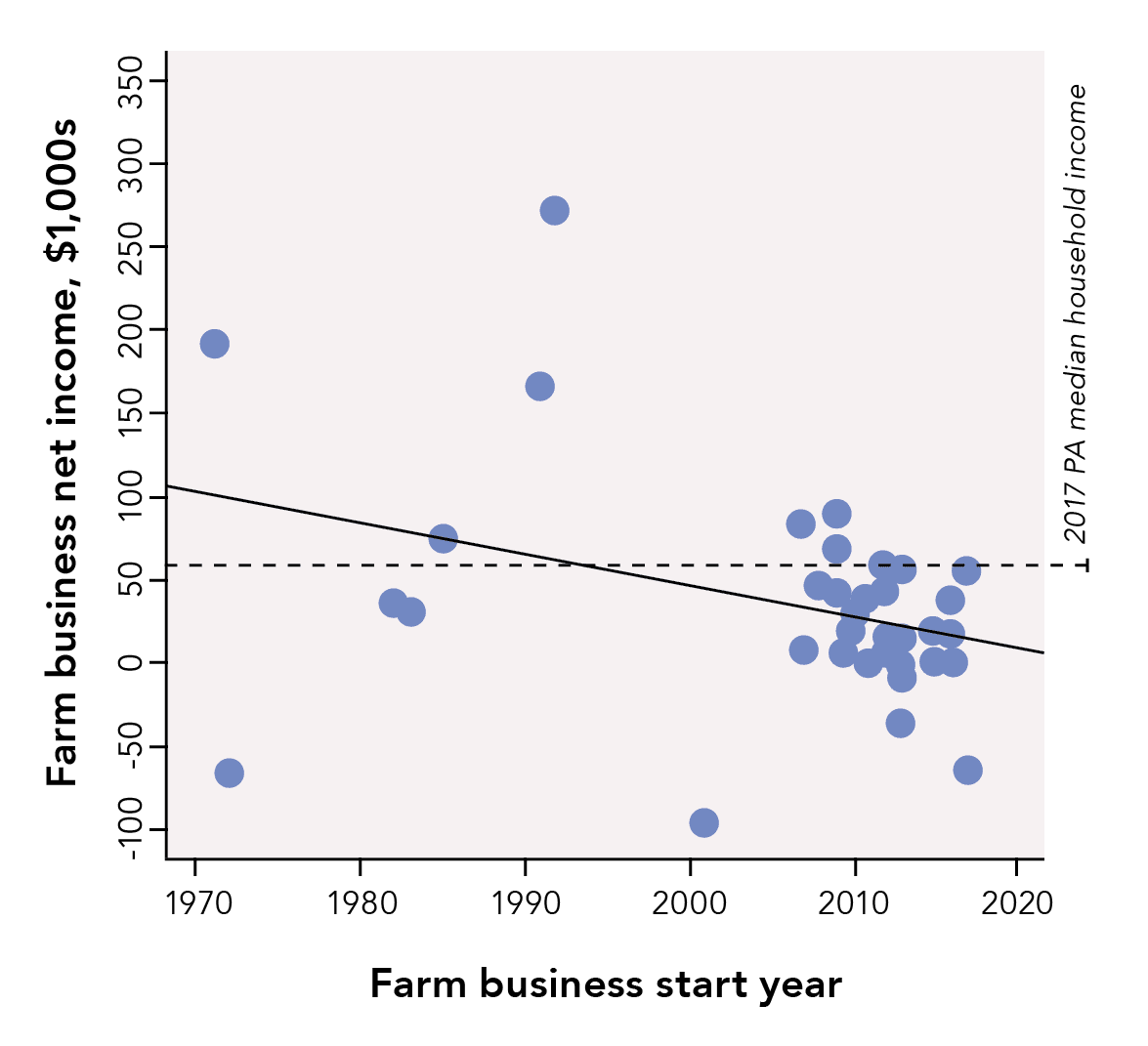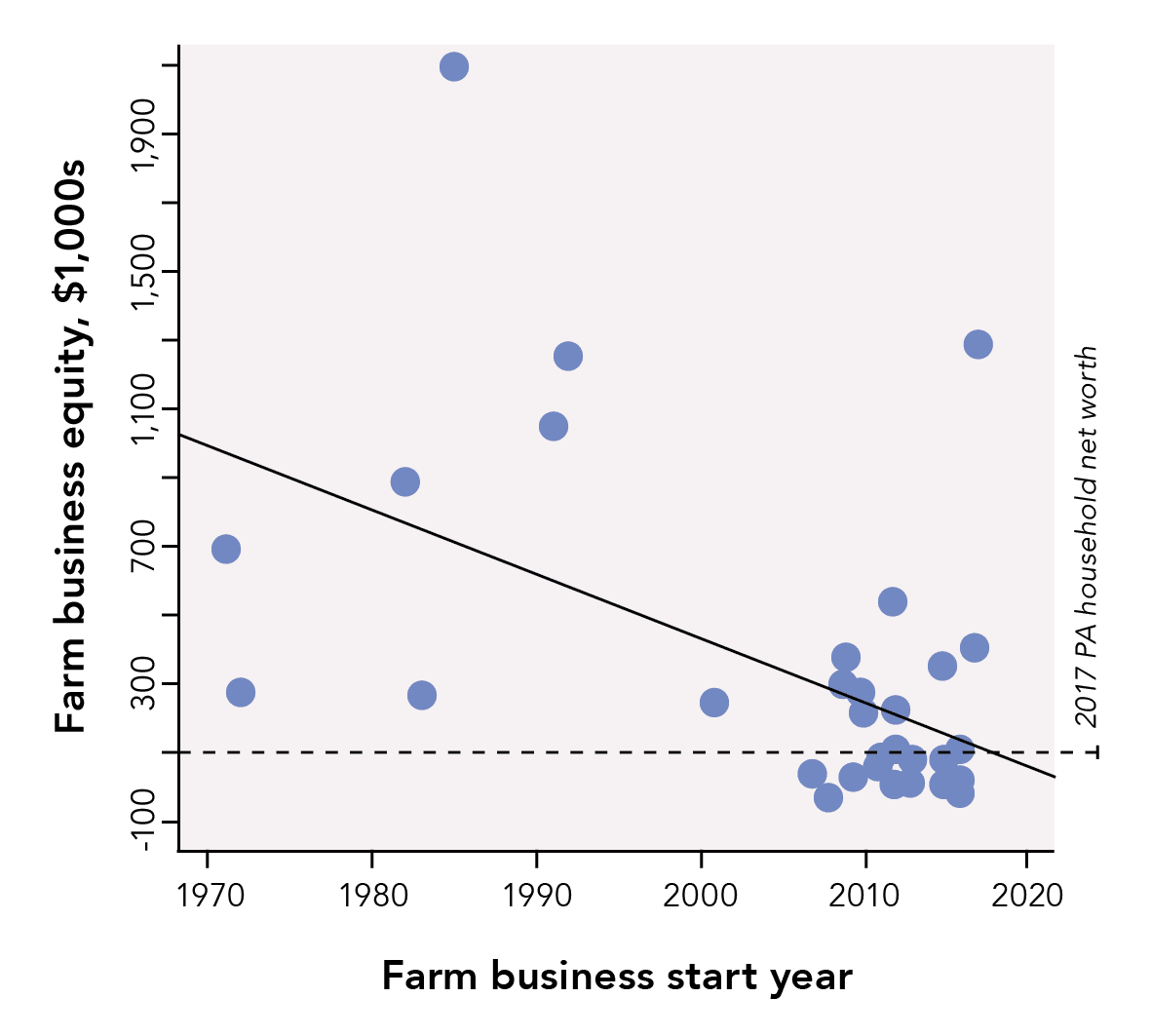The post Welcome to our new pre-apprenticeship training partners! appeared first on Pasa Sustainable Agriculture.
]]>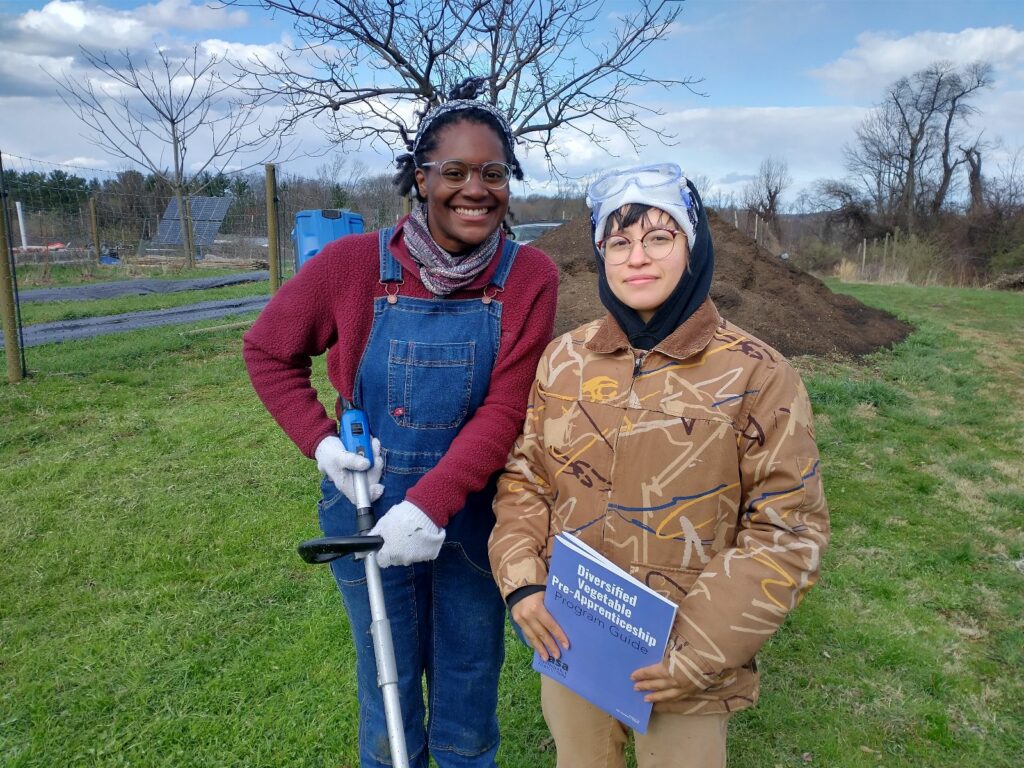
Last year we launched our Diversified Vegetable Pre-Apprenticeship with two beginner farmer training programs in Pennsylvania. As pre-apprenticeship heads into its second growing season, seven new training partners have signed on to offer this credential to aspiring farmers they work with. Four college-based farms have joined, along with a nonprofit that helps people overcome barriers to employment, and two programs in Philadelphia including an educational nonprofit and a farm business.
The flexibility of pre-apprenticeship allows each training partner to implement the curriculum at a pace that makes sense for them and for the participants.
We piloted the program in its first season at two educational nonprofit farms. The LEAF Project cultivates youth leaders from diverse backgrounds through meaningful work in the food system and operates a three-acre vegetable farm in Perry County, Pennsylvania. Grow Pittsburgh’s Urban Farmers in Training Program provides local teens with the opportunity to gain summer employment while learning about the value of growing and eating healthy food.
“We’ve been excited to implement Vegetable Pre-Apprenticeship as an innovative way to synthesize working on our urban farm spaces and sharing education in a very hands-in-the-dirt kind of way that intentionally tracks what someone is learning.”
Eva Barinas, Director of Farm Education and Production at Grow Pittsburgh
Three college-based farms have signed on as training partners to offer pre-apprenticeship to students.
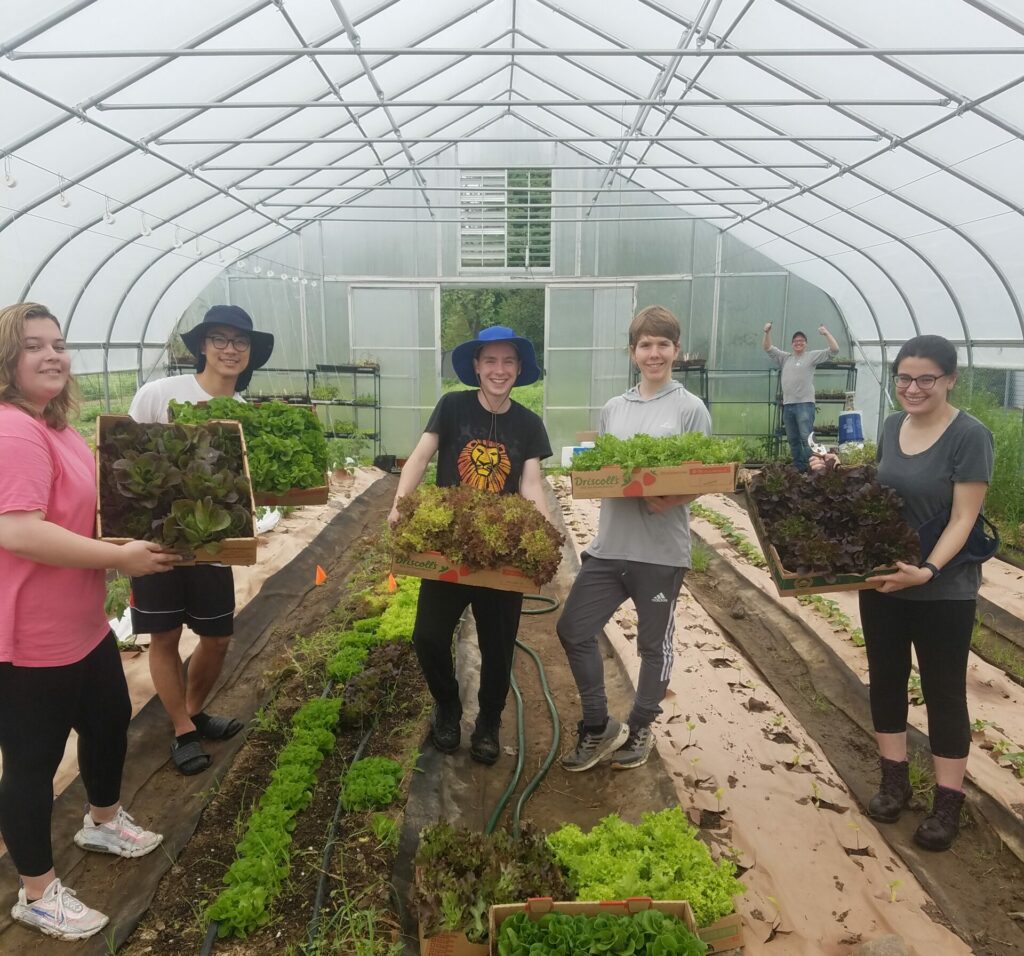
Bucknell University students engage in sustainable farming and food access programs at the Bucknell Farm on campus and at the nearby Lewisburg Community Garden.
LaFarm is a sustainability initiative at Lafayette College in Easton, Pennsylvania. The farm’s mission is to integrate curriculum and practice in sustainable food and agriculture for the campus community. They grow produce for the dining halls, recycle nutrients from composted food back to the soil, and serve as a home for collaborative student-faculty education and research.
Dickinson College Farm is an 80-acre, organic farm where students can gain hands-on learning experiences in sustainable agriculture and renewable energy. Student employees, graduate apprentices, and volunteers are involved in all aspects of food production and research on the farm, which provides food to the campus and local community in Carlisle, Pennsylvania. Dickinson also hosts a full-time farm apprentice through our Diversified Vegetable Apprenticeship.
Some training partners work with people as young as 14, while others work with those well into adulthood.
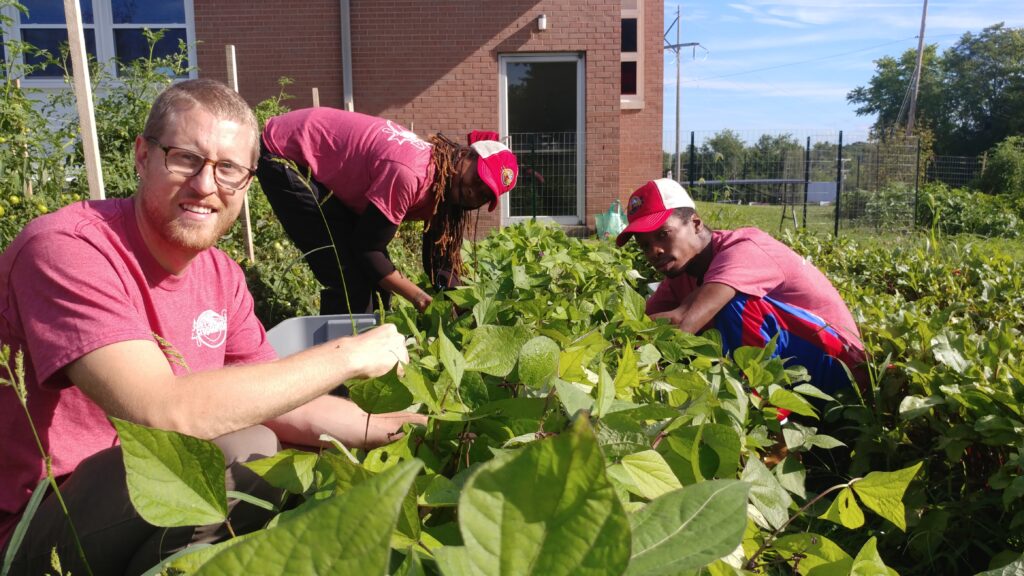
Located outside of Pittsburgh in Ambridge, Pennsylvania, Crop & Kettle is a nonprofit that utilizes the food system to provide job training and social development for members of their community who are eager to overcome barriers to employment. Grow Pittsburgh has also expanded its participation this year to offer a pre-apprenticeship track to an adult beginning farmer cohort.
Two of the new training partner programs are based in Philadelphia. Greensgrow is an educational urban farm and demonstration garden that provides an essential connection to food and nature in Philadelphia. Truelove Seeds is a seed company focused on providing culturally-important seeds to people longing for their tastes of home. They also have many community facing programs including a farmer training program for growers aspiring to incorporate seed keeping into their work as growers and stewards of culture.
As farms across the state are struggling with labor shortages, this program offers a valuable tool for workforce development. Pre-apprenticeship can also play a role in advancing diversity, equity, inclusion, and justice in agriculture by serving as the first stepping stone on a career path toward becoming a farm manager or owner.
The curriculum is based on the core duties, skills, and qualifications for our two-season vegetable farming apprenticeship program, Diversified Vegetable Apprenticeship, which means pre-apprentices who want to keep learning about agriculture have a built-in next step for more extensive training. Both programs are registered with the Pennsylvania Department of Labor and Industry.
Any organization that currently administers, or is planning to administer, vegetable farming training opportunities for either youth or adults can become a Diversified Vegetable Pre-Apprenticeship training partner! Training partners manage recruitment, training, and supervision of pre-apprentices, while Pasa provides curriculum and administrative support.
Over 50 pre-apprentices are currently enrolled in pre-apprenticeship. Two participants completed their pre-apprenticeships last year, and four more are on track to graduate in the next few months. Stay tuned to our social media for profiles of the new grads and an Instagram takeover from some current pre-apprentices.
Learn more:
Read about sprouting pre-apprenticeship last year at the LEAF Project.
Interested in becoming a pre-apprentice or a training partner? Learn more about the program here, and reach out to Lisa at dvp@pasafarming.org or 814.349.9856 x725 with any questions.
Already have a year of farmer training under your belt? Check out our two-season apprenticeship.
The post Welcome to our new pre-apprenticeship training partners! appeared first on Pasa Sustainable Agriculture.
]]>The post Meet our 2022 Diversified Vegetable Apprenticeship graduates appeared first on Pasa Sustainable Agriculture.
]]>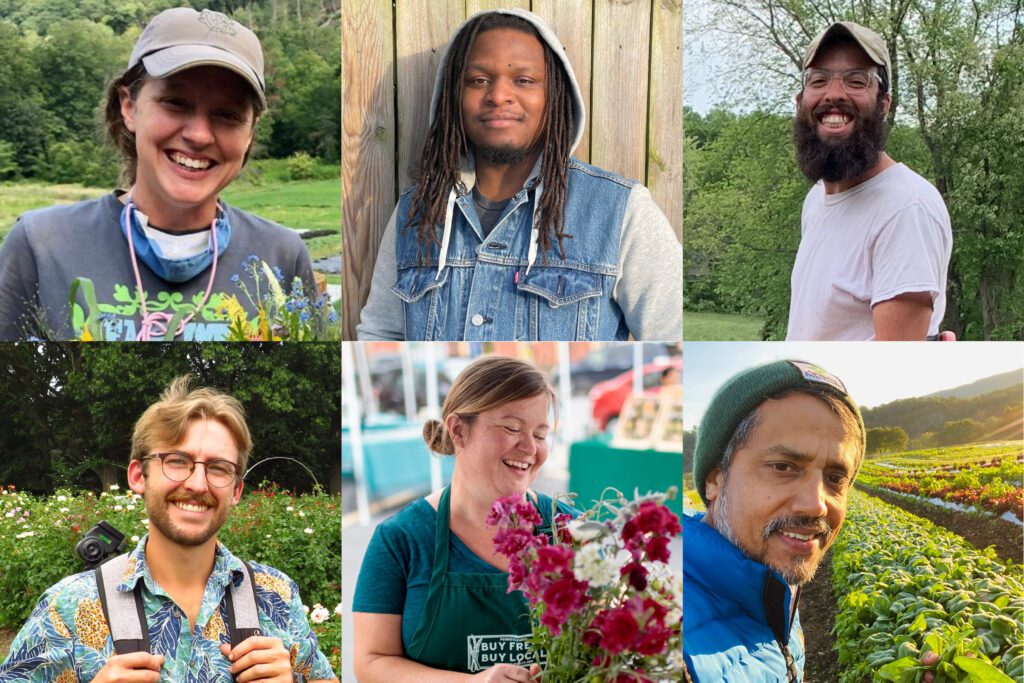
Whether they studied math, education, or culinary arts, whether they served in the military or grew up on a farm, the six individuals graduating from Diversified Vegetable Apprenticeship this spring each brought their own unique strengths to the farms that hosted them.
Each apprentice completed 2,700+ hours of on-the-job training and 200+ hours of coursework over 18 months, and they’re now embarking on careers growing a more sustainable food system.
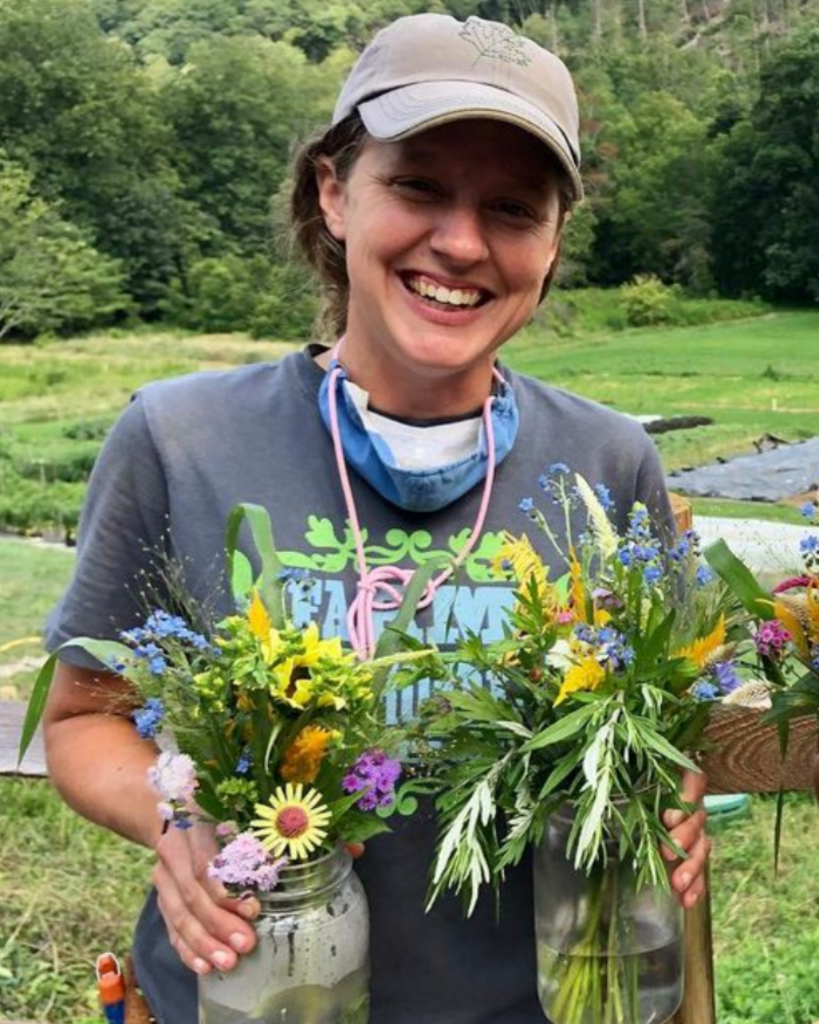
Amber Bahn
hosted by The LEAF Project
Before farming: studied education and taught abroad
Farm stat: 82 households fed from LEAF’s weekly share
Favorite farm task: seeding and planting
Least favorite farm task: bed-prepping by hand
Favorite beneficial insect: assassin bugs
Up next: Amber is staying on as farm manager with LEAF for the foreseeable future and continuing to help with students participating in our Diversified Vegetable Pre-Apprenticeship.
“Farming requires an incredibly diverse skill-set. Using the program’s skills checklist, I was able to easily figure out where my strengths were, as well as the areas I had not yet been exposed to.”

Erik Sink
hosted by Apple Ridge Farm
Before farming: studied math and economics
Farm stat: worked 7 farmers markets in 3 states
Favorite farm task: weeding—very relaxing!
Least favorite farm task: anything involving chickens
Favorite beneficial bug: lady bug
Up next: “I started a fermented drink business in 2021 with my mentor farmer. We’ve seen a lot of growth. I’m looking forward to continuing the business and expanding to other markets and products.”
“I’ve really developed a lot not only as a farmer but also as a business professional. I’ve gained many connections and learned a lot about working with people and customers. Although apprenticeship focuses on farming, you’ll come away with much more experience in life as a whole”

San Sankofa
hosted by New Morning Farm • Tooth of the Lion Farm & Apothecary
Before farming: served in the military
Farm stat: dried over 1,000 pounds of herbs and flowers last season
Favorite farm task: installing and maintaining irrigation
Least favorite farm task: weeding
Favorite beneficial bug: praying mantis
Up next: San’s planning to start a farm business growing herbs, making teas, tinctures, and herbal smoke blends to help fellow veterans and soldiers dealing with stress, anxiety, depression, and insomnia. He also recently joined Pasa’s board.
“I was involved in all sides of these farm businesses, from planting seeds to harvesting and marketing the finished product… I now feel confident that I have the skills I need to succeed as a farmer.”
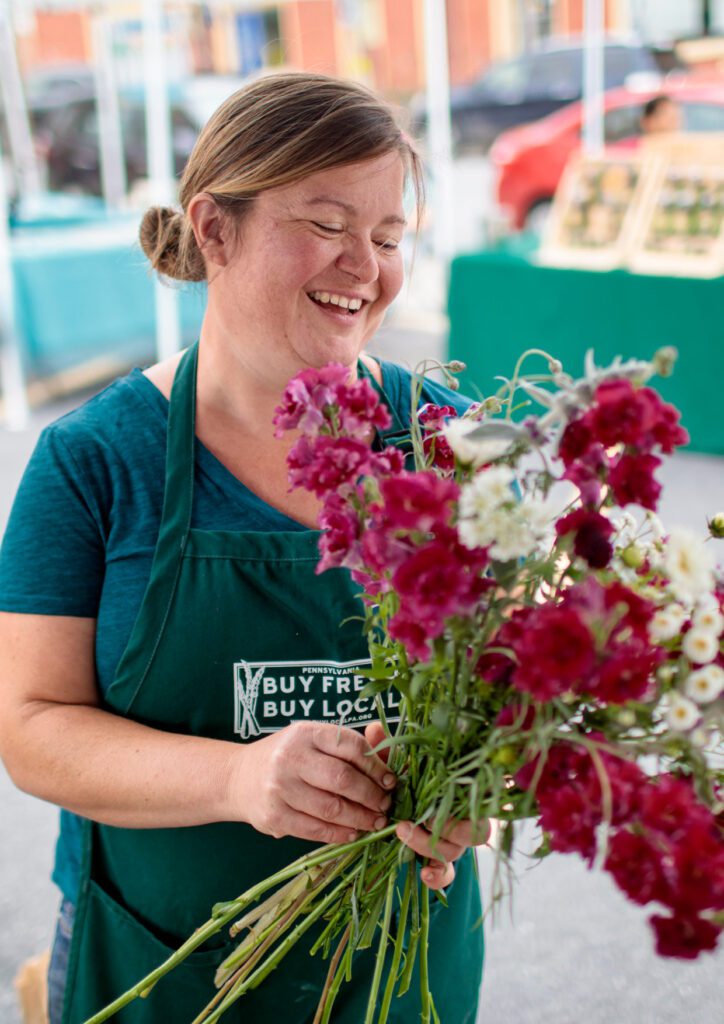
Phoebe Brubaker
hosted by Village Acres Farm & Foodshed
Farm stat: planted close to 3,000 trees and shrubs for a riparian buffer project
Favorite farm task: planting and weeding
Least favorite farm task: fixing broken irrigation pipes
Favorite beneficial bug: lady beetles
Up next: Phoebe’s getting back to growing and designing with specialty cut flowers in a new business venture with her sister.
“Flexibility is key, particularly in a pandemic. I tend to love the planning side of things, but the ability to assess value and pivot within a season is so important. Holding on too tightly to an idea that is not profitable can be damaging to a bottom line.”
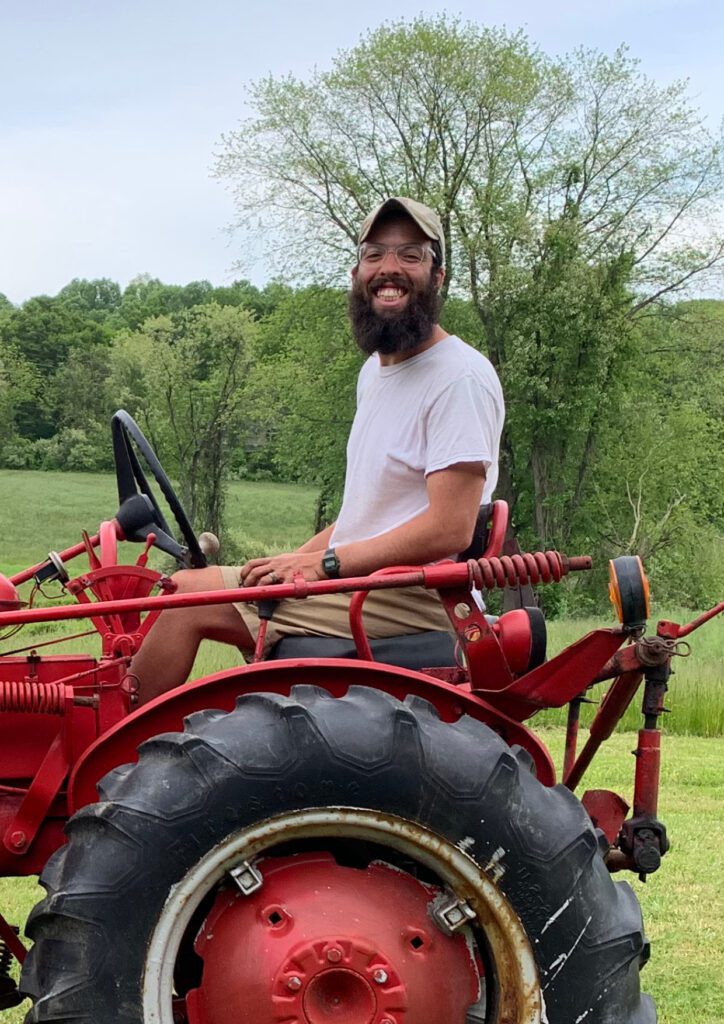
RJ Brison
hosted by North Star Orchard
Advice to prospective apprentices: “Don’t run the undercutter too deep.”
Favorite farm task: cultivation
Least favorite farm task: wash room
Favorite beneficial bug: “Worms are cool.”
Up next: RJ plans to work on his family’s farm. “We’re making a big transition from conventional monocropping to a diverse landscape that’s as good for the wildlife as it is for us and our well-being.”
“I found my personal farming niche, Truthfully, it really helped me find what I want to do as well as what I definitely do not want to do. And apprenticeship allowed me to do this in an environment that’s a bit more forgiving than if I attempted things on my own farm.”
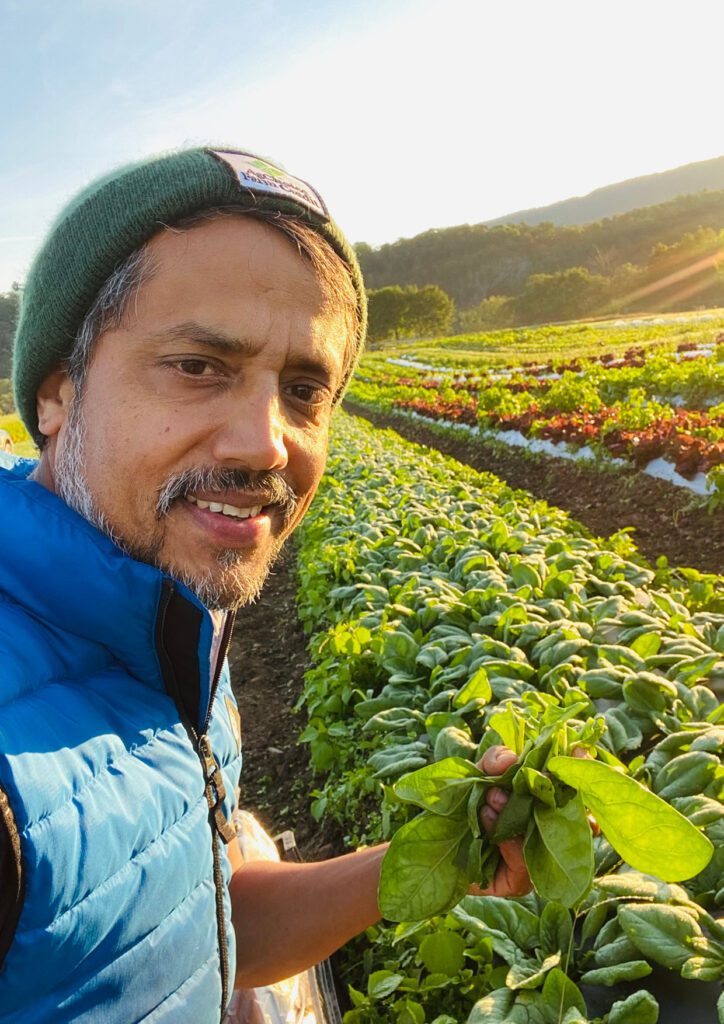
Subarna Sijapati
hosted by New Morning Farm
Before farming: trained as a chef
Favorite farm task: harvesting greens and garlic
Least favorite farm task: waiting out the slow-growing winter months
Favorite beneficial bug: crab spider
Up next: Subarna plans on starting his own farm-to-table operation, specializing in culinary herbs. He was also recently elected to Pasa’s board.
“It’s very intimidating in the beginning… to manage a crop and take full responsibility for its well being. But don’t forget, plants are resilient—just like us, they want to grow well.”
Interested in becoming an apprentice?
Get comprehensive on-the-job training while you earn a progressive wage. Learn more and apply here.
Interested in hosting an apprentice on your farm?
Help train the next generation of sustainable producers—and gain a committed, pre-qualified employee. Host an apprentice on your farm.
Want to support our farmer training programs?
Make an investment in a brighter future for our food system and our planet. Become a Perennial Donor.
The post Meet our 2022 Diversified Vegetable Apprenticeship graduates appeared first on Pasa Sustainable Agriculture.
]]>The post Can direct-market vegetable farmers make a middle-class income? appeared first on Pasa Sustainable Agriculture.
]]>Vegetable farms that sell their produce through farmers markets, CSA programs, on-farm stores, and other direct-market channels are the foundation of local food movements everywhere. Yet there is surprisingly little information available to help answer a basic question: Can farmers make a middle-class income selling vegetables through direct-market outlets?
We launched an ongoing study in 2017 to help fill this critical gap in information and provide insights that could help vegetable farmers start and grow their businesses. Our new report offers the most comprehensive review of direct-market vegetable farm businesses to date, sharing detailed financial benchmarks from 39 farms collected over three years.
Participating farms were located in four Mid-Atlantic states: Pennsylvania, Maryland, Virginia, and West Virginia. Most had less than 15 acres in vegetables production; the largest had approximately 100. Farms studied had been in business for anywhere between one and 50 years.
STUDY PARTICIPANTS: ACRES IN VEGETABLES PRODUCTION
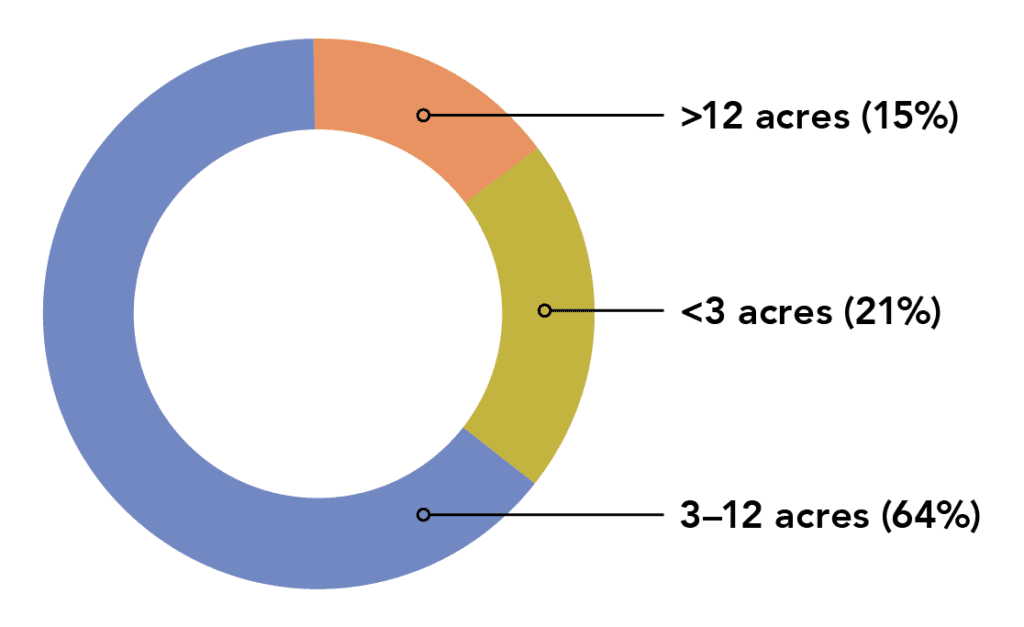
Findings
Our findings were consistent with structural challenges that negatively impact small- and medium-scale farms in a highly consolidated agriculture industry. In other words: They were sobering.
We found that the majority of direct-market vegetable farms were not earning a middle-class income. Participating farms had a median net income of $18,500, which approximates the 2020 poverty rate in Pennsylvania for a two-person household. Further, the net incomes of more than 70% of the farms in our study were less than half the median net income for all Pennsylvania farms, which include among others dairy, row crop, and wholesale vegetable operations.
MEDIAN NET INCOMES FOR PA HOUSEHOLDS, FARMS & STUDY PARTICIPANTS
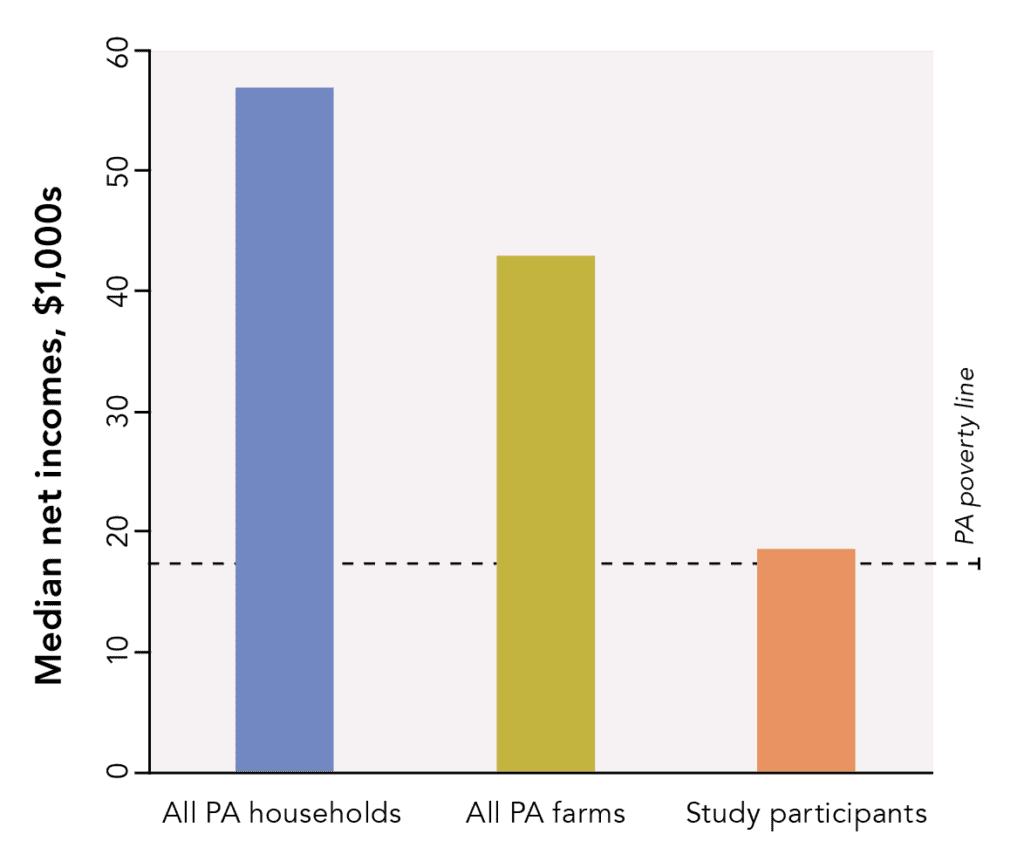
We did find some farms bucking the trend. A quarter of study participants had earned net incomes greater than the Pennsylvania median household annual income of $57,000. These farms tended to be larger in scale than many market-garden-style farms—typically, ten acres or more in vegetable production—and often capitalized on diversifying their revenue streams, with reselling products produced by other local farms proving to be one of the more profitable added enterprises.
Notably, however, many of the owners of these high-performing farms partially attributed their success to good fortune, such as access to especially lucrative markets or reliable farmland arrangements.
VEGETABLE ENTERPRISE NET INCOME RELATED TO ACRES IN VEGETABLE PRODUCTION
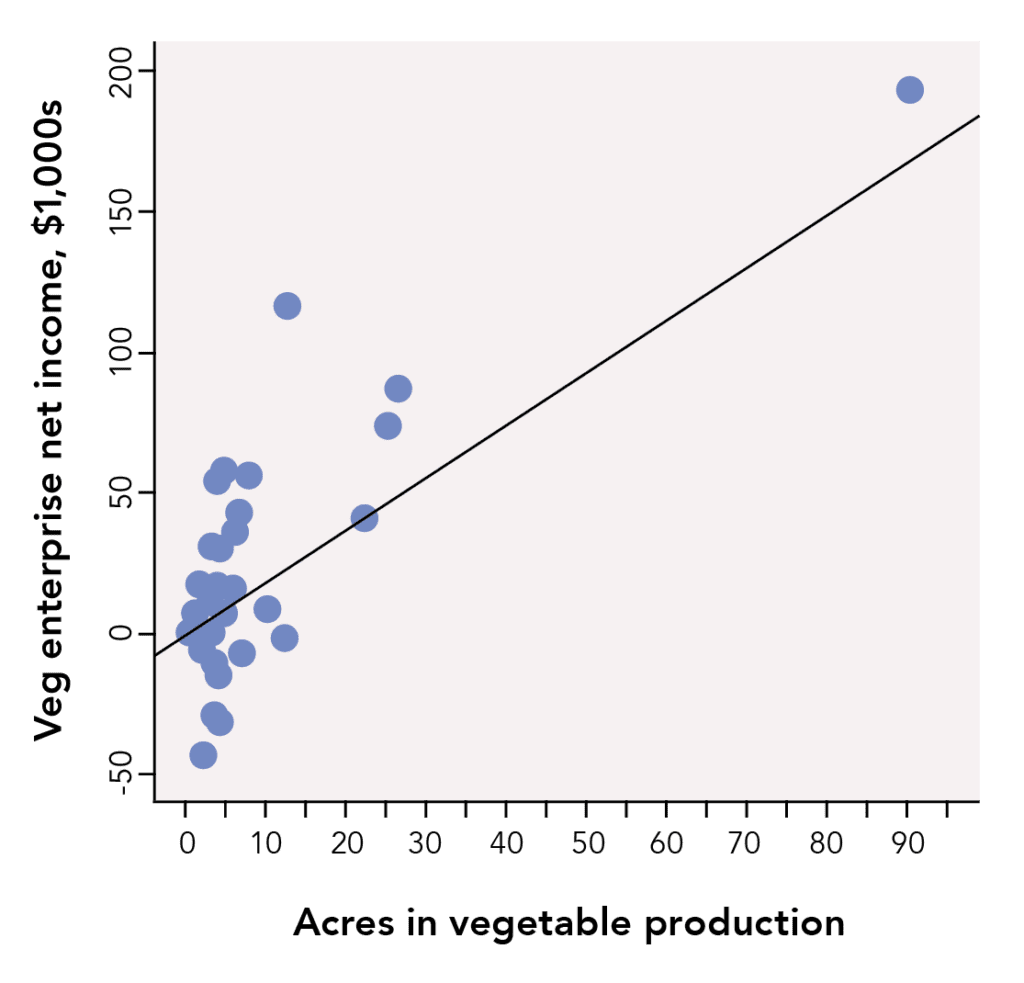
We also found that farms steadily increased income and equity over time, generally becoming more profitable the longer they were in business. Most farms’ net incomes exceeded the Pennsylvania median household income within 12 years of business, while accumulating equity in land, buildings, and equipment in the meantime.
FARM BUSINESS NET INCOME (LEFT) & EQUITY (RIGHT) RELATED TO NUMBER OF YEARS IN BUSINESS
Interestingly, no single direct-market channel consistently outperformed all others. We found that all of the major sales channels utilized by farms in the study—farmers markets, CSAs, and direct wholesale—had a mix of higher and lower income cases. For farmers wondering whether or not to focus on selling their produce through particular direct-market channels, this finding indicates there isn’t a one-size-fits-all business model for financial success.
NET VEGETABLE ENTERPRISE INCOME & MARKET CHANNEL COMPOSITION
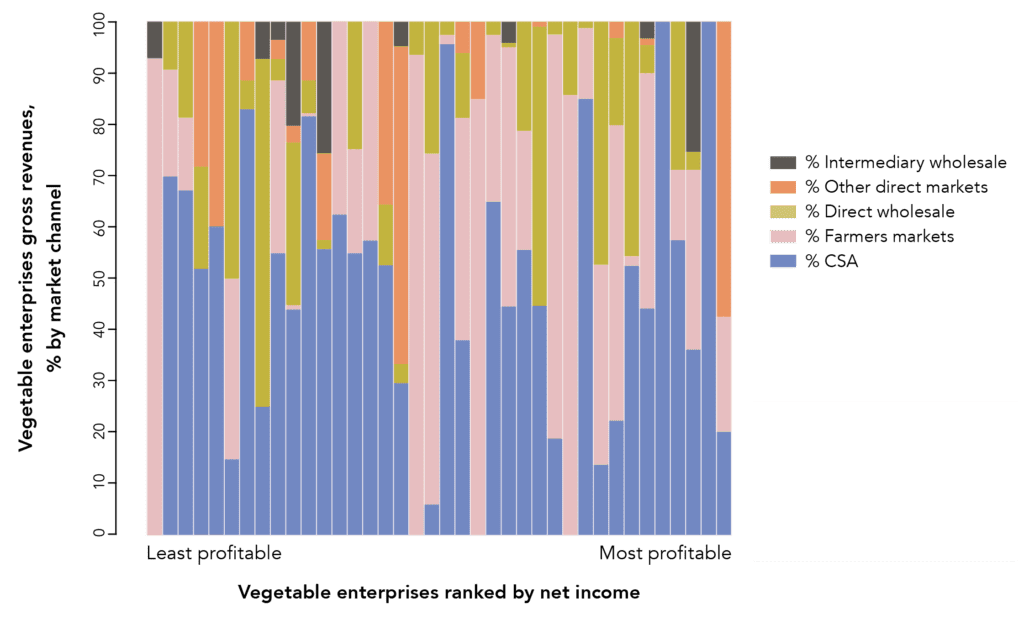
Pathways to higher incomes
We identified three primary pathways for improving direct-market incomes: (1) increasing the number of acres in vegetable production; (2) growing more and higher-value crops per acre; and (3) developing more efficient production systems. Still, the land, labor, and capital needed to pursue these strategies may be out of reach for farmers who are operating at a loss or aren’t earning a living wage.
SCENARIOS FOR ACHIEVING A NET INCOME GOAL ($56, 951) BY INCREASING SCALE, INTENSITY, OR EFFICIENCY
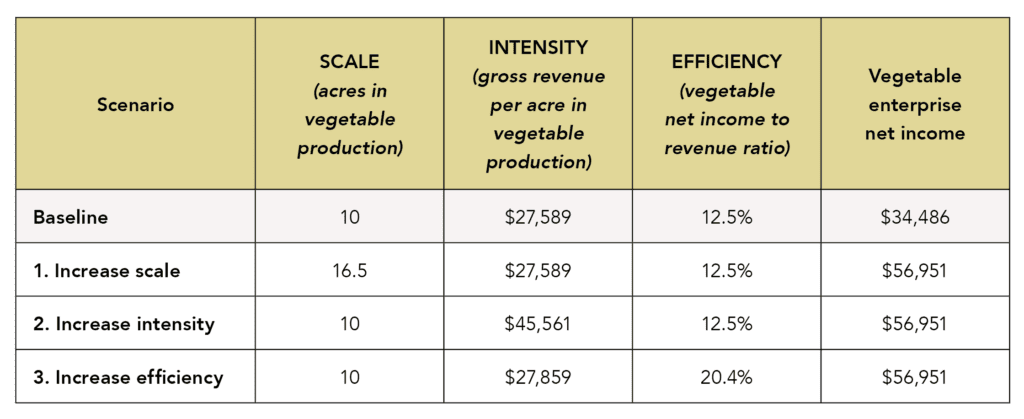
While all farmers want to operate profitable, self-sustaining businesses, the financial benchmarks identified by our study are consistent with industry structural challenges that negatively impact small- and medium-scale farms. Creating and expanding public and private programs and partnerships will be necessary to help direct-market vegetable farmers continue their essential work providing fresh, nutritious food for their communities.
These programs and partnerships should focus on equitably increasing farmland access, improving market opportunities, encouraging workforce development, reducing financial risk, and rewarding conservation best practices such as building soil health, protecting wildlife, and improving water quality.
What’s next?
Our financial benchmarking research is ongoing. Since compiling the findings detailed in our new report, we’ve partnered with peer organizations in New England (Community Involved in Sustainable Agriculture) and the Carolinas (Carolina Farm Stewardship Association) to expand the scope of our study to include data from vegetable farms located outside of the Mid-Atlantic region. We will also be analyzing the impact the coronavirus pandemic has had on study participants.
Read the full report: Financial Benchmarks for Direct-Market Vegetable Farms: 2021 Report
Our Financial Benchmarks Study was initially made possible with investments from Lady Moon Farms, the Jerry Brunetti family, the Shon Seeley family, and more than 120 private donors committed to strengthening local and regional food systems. Additional support was provided by a Pennsylvania Department of Agriculture Specialty Crop Block Grant and a Pennsylvania Department of Agriculture Research Grant.
Want to join this study?
If you are a direct-market vegetable farmer and are interested in joining this study, email us at research@pasafarming.org. Participating farms get custom financial benchmark reports and access to a learning community of their peers.
The post Can direct-market vegetable farmers make a middle-class income? appeared first on Pasa Sustainable Agriculture.
]]>The post Sprouting Pre-Apprenticeship at the LEAF Project appeared first on Pasa Sustainable Agriculture.
]]>In this blog post, LEAF Founder and Executive Director Heidi Witmer explains how hosting our pre-apprenticeship program complements LEAF’s work engaging youth leaders in the food system. Heidi is also a Pasa board member.
The seeds that grew into LEAF
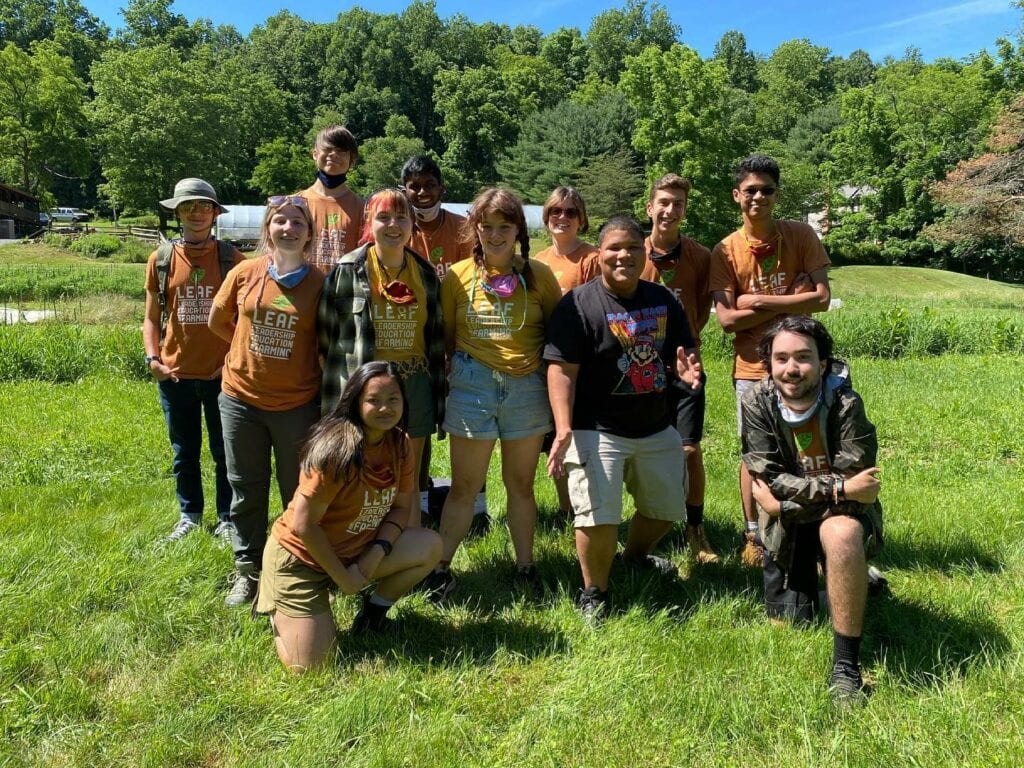
We asked Heidi where the idea for the LEAF (Leadership Education and Farming) Project came from, and she pointed to several seeds of inspiration. When she started a market garden side business after college, she drew on her childhood experience helping on family farms with production and canning, and she had her extended family as farming mentors. “I was lucky to grow up very connected to our regional food system,” she said. “With LEAF, I wanted to help make entry points into the food system for kids who grow up outside of farming families.”
It was when she was working at a school in Harrisburg, Pennsylvania that Heidi recognized a problem that was really an opportunity. “There was a lot of research at the time about ‘summer learning loss.’ But I felt like rather than talking about what students were losing, we should be imagining different kinds of experiences they could be gaining over the summer break.” She gave her students an assignment to find summer jobs or volunteer positions, but at the time (late 2000s, early 2010s) youth employment was at a record low. Heidi said, “My students were coming back with 20 plus rejection letters. I realized it wasn’t the world I had grown up in, where everyone could have a summer job. There was a critical need for youth engagement and employment.”
Growing connections & leaders
“If you don’t grow up on a farm, you can just drive by corn fields all your life and you have no idea the work that goes into it. There’s a profound disconnect.”
Heidi saw an opportunity to connect the vibrant agricultural sector she grew up in with an untapped resource — youth employees — to meet some of our region’s most pressing challenges: food insecurity, a rise in food-choice-related health challenges, and workforce development. She imagined LEAF as a way to help students discover their strengths, grow their leadership skills, and gain experience that would help them qualify for any job or entrepreneurial endeavor they want to try next. She also hoped that many of them would begin to see themselves as part of the food system. “If you don’t grow up on a farm, you can just drive by corn fields all your life and you have no idea the work that goes into it. There’s a profound disconnect.”
LEAF works to grow that connection by cultivating youth leaders from diverse backgrounds through meaningful work in the food system. Students ages 14–18 can participate in up to four years of paid positions, beginning with introductory work, then progressing to specialized roles and taking on leadership responsibilities.
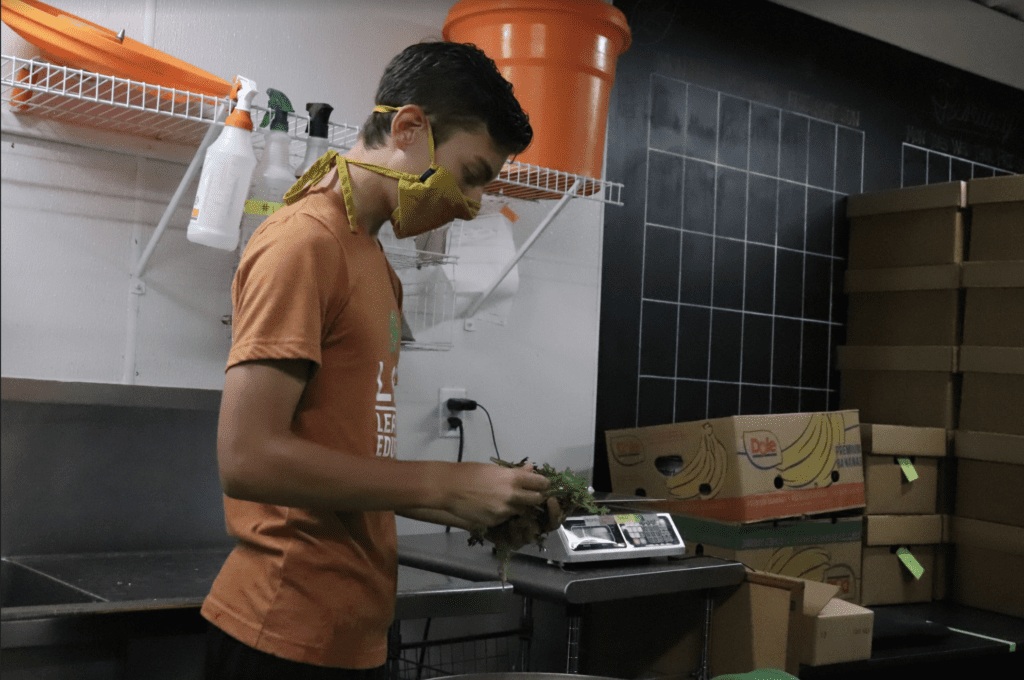
The LEAF farm is located on the same land in Perry County, Pennsylvania where Heidi started her market garden. “It’s a relatively small farm, but it’s become a much bigger enterprise than when I was running it solo,” she said. Students operate one-and-a-half acres of production fields and tunnels, and distribute 100 weekly summer farm shares to community members. They also sell at regional farmers markets, manage wholesale accounts with local restaurants, and donate to hunger relief organizations. LEAF additionally runs its own commercial kitchen that specializes in preserved and value-added products.
“The young people here are doing every piece of this farming business puzzle. Not just in the field and in the kitchen,” said Heidi. “They’re doing profit analysis, marketing, assessing our strengths, finding where the gaps are, and asking bigger picture questions, like ‘what does food system equity look like in our region?’”
LEAF also partners with many local for-profit farms to give students a chance to experience different types and scales of production as well as to meet food system role models. To Heidi, these partnerships are the backbone of LEAF: “Our students are at a really pivotal point. They’re starting to make decisions about the direction their lives will take and asking ‘what do I want to do for a career’? So it’s wonderful for them to be meeting farmers and other food system leaders who are making a difference in their communities.”
The first rung in a ladder
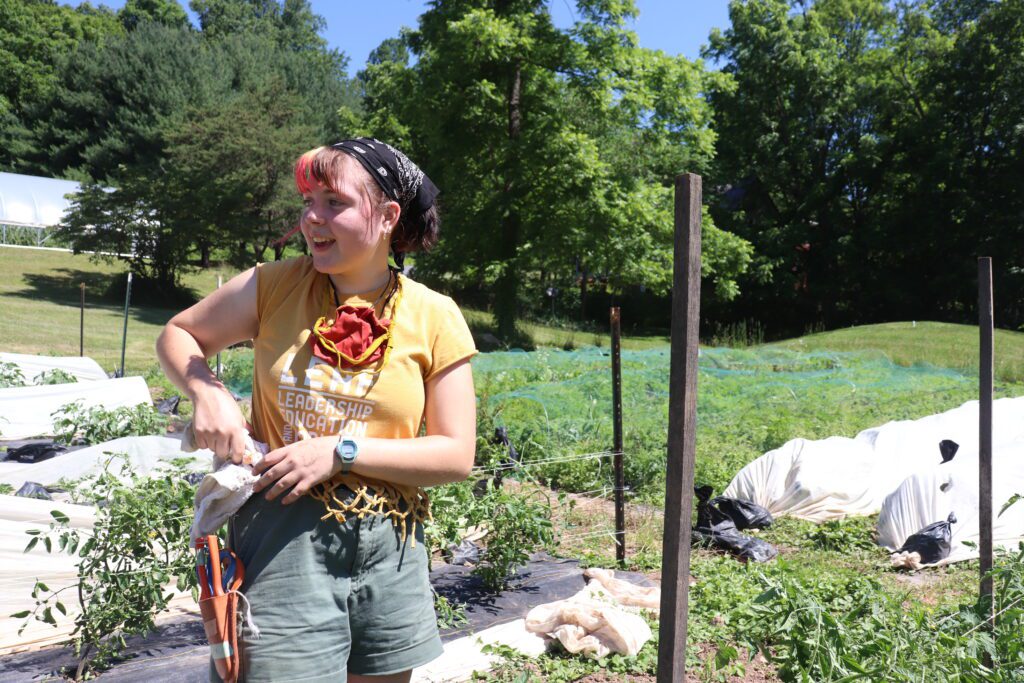
Of the 25 students participating in LEAF this season, nine are enrolled in our Diversified Vegetable Pre-Apprenticeship.
Heidi says, “We’re so excited to add the Pre-Apprenticeship program to the work we’re doing with LEAF. It’s great to be able to offer students the credential of Pre-Apprenticeship registered with the Department of Labor and Industry. It really compliments our goals of introducing youth to farming while also honoring their talents and accomplishments. We also offer our students pay raises when they reach certain levels of competency, and the structure of Pre-Apprenticeship really gives us a perfect framework for that.”
Our Pre-Apprenticeship is based on the core skills and qualifications for our intensive two-season vegetable farming apprenticeship to offer a built-in next step toward more extensive farmer training.
As a Pasa board member and farmer educator, Heidi was involved in the development for both programs. “For the full apprenticeship, we asked ourselves, what does it truly take to run a farm? And it was pretty humbling to recognize the breadth and depth of those job requirements. Ultimately we identified 15 key competency areas.”
Then when it came to translate those learning objectives to an introductory program, Heidi said, “We asked ourselves what do you need to know to get the basics? Fewer competency areas? Or maybe just a smaller percentage of each topic, and that’s the way we decided to go. So the Pre-Apprentices are really getting a broad introduction to all these aspects of running a farm business.”
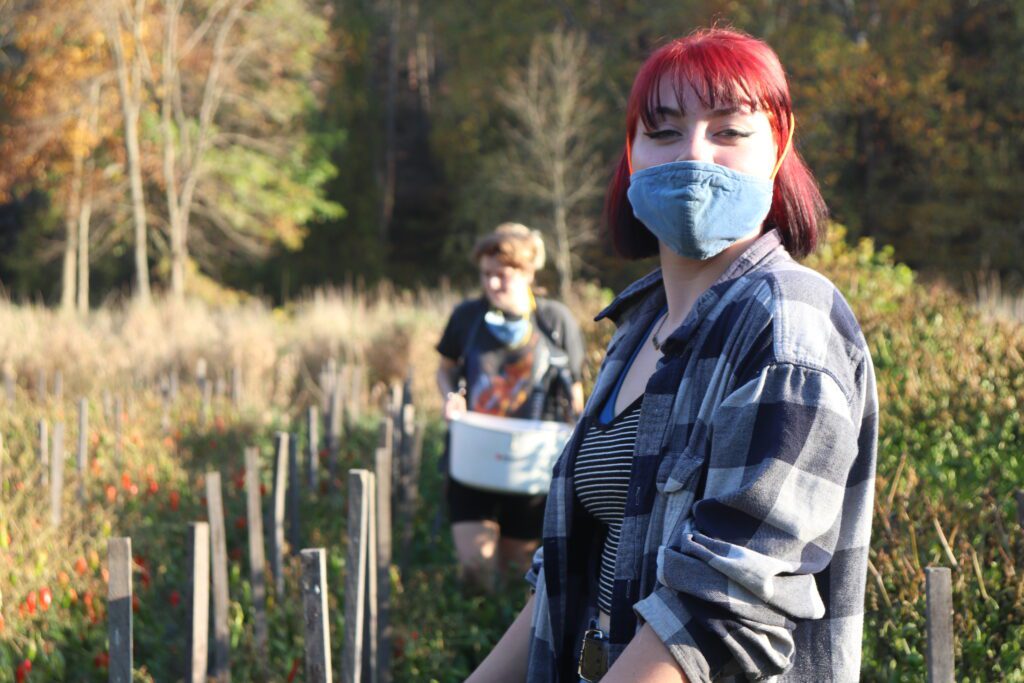
The breadth of the Diversified Vegetable Pre-Apprenticeship curriculum is clear when you talk with the pre-apprentice students at LEAF. Pre-Apprentice Emma den Hoed has been out in the field learning about pest management. She says, “I’m really looking forward to learning more about crop rotation as well as how to operate greenhouses.” Pre-Apprentice Jared McChesney has been learning a lot about the financial side of farming: “I was shocked about how much it takes to make a budget for even a small nonprofit farm like this.”
Heidi says, “I love that it’s like this ladder — Pre-Apprenticeship is the first rung. And then a two-season apprenticeship or one of our more specialized internships after that, and then hopefully one day managing a farm or starting a food-related business. My goal is to see how far we can get our youth up that ladder.”
Host pre-apprentices at your organization. Any organization that currently administers, or is planning to administer, vegetable farming training opportunities for either youth or adults can become a Diversified Vegetable Pre-Apprenticeship host site! If you’re interested, contact Dan Dalton at dan@pasafarming.org or 814.349.9856 x710 for more information.
The post Sprouting Pre-Apprenticeship at the LEAF Project appeared first on Pasa Sustainable Agriculture.
]]>